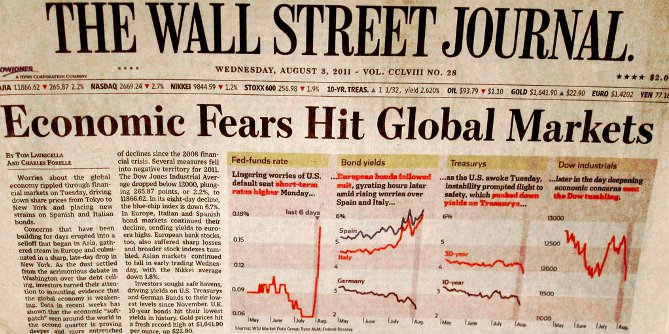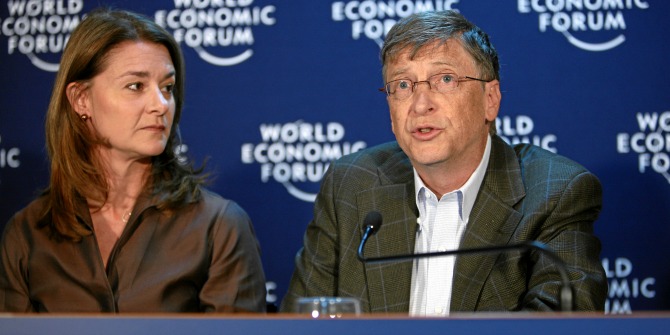 The 2016 election campaign has been already been marked by the preponderance of ‘expert’ pundits who hold forth on the importance of candidates’ statements and policy positions. In new research, Douglas Pierce argues that despite their claims political experts form their opinions in a very similar fashion to the rest of the population. He writes that their expert political judgments are just as likely to be informed by emotional reactions, partisanship, and confirmation bias as those of ‘non-experts’.
The 2016 election campaign has been already been marked by the preponderance of ‘expert’ pundits who hold forth on the importance of candidates’ statements and policy positions. In new research, Douglas Pierce argues that despite their claims political experts form their opinions in a very similar fashion to the rest of the population. He writes that their expert political judgments are just as likely to be informed by emotional reactions, partisanship, and confirmation bias as those of ‘non-experts’.
Social scientists, journalists, and political philosophers have long been concerned with the low-levels of political information among the populace. Survey after survey reveals the same distressing results: most citizens have little knowledge of government, politicians, or policy. This dismal state of affairs has led many political observers to question the wisdom of democratic participation. For instance, the New York Times’ resident ethicist, Randy Cohen, has opined that it is wrong for the uninformed to “put their ignorance into action when voting” while political philosopher Jason Brennan has argued that “voting while uninformed” is not much different than driving while intoxicated—an ethically unjustifiable action that puts other people at risk. The clear inference from statements like these is that politics is best left to the “experts”—those citizens who are knowledgeable enough about governmental affairs to develop sophisticated political preferences.
The notion of political expertise has a long tradition in Western political culture, stretching back at least to Plato’s “philosopher kings.” The idea itself is intuitively pleasing; some citizens take the time and effort to formulate wise and judicious policy preferences based on reason and evidence, while the majority of people hold political opinions based on little more than emotions, or the personal characteristics of politicians, or blind loyalty to party. Empirically-minded political scientists have lent credence to this view by publishing books and papers extolling the judgment of politically sophisticated citizens while claiming that the political opinions of a great many people are rife with “bias” and “error.”
Despite the largely uncritical acceptance of the concept of political expertise among political pundits, theorists, and political scientists, there is precious little evidence to support the claim that politically knowledgeable citizens form their opinions in a manner befitting the term “expertise.” In fact, when we have looked at the information-processing strategies of politically sophisticated citizens in controlled experiments, we see a number of behaviors that call into the question the assumption of expert political judgment.
Credit: Flickred! (Flickr, CC-BY-NC-2.0)
First, politically sophisticated citizens are more likely to experience emotional reactions to political stimuli. This is important because the presence of affect during judgment and evaluation often leads people to reason in a way that supports their preconceived notions and beliefs. Second, politically sophisticated citizens are more likely to interpret policy facts through a partisan lens, suggesting that their beliefs are partly shaped by loyalty to party rather than “objective” appraisals of the evidence. Third, political experts are more likely to seek out information that confirms their own beliefs and discount counter-evidence more strongly than non-experts when considering policy alternatives. And lastly, politically knowledgeable citizens were barely more likely than non-experts to employ a “rational” information-gathering strategy (i.e., trying to examine as much evidence as possible about the candidates in an election) when making a voting decision; however, use of such a strategy made political experts less likely to choose the candidate whose policies best matched their previously stated preferences. In all, political experts seem to engage in a process of opinion-formation that is a far cry from the assumption of reasoned and dispassionate analysis made by proponents of the expertise view.
Skeptical readers (who are likely political experts themselves and may blanch at the thought that their political beliefs are not as rational as they think) might argue that these studies do not necessarily indicate how experts behave outside the laboratory or when forming “real world” political judgments. But the larger question remains of how exactly do we know how politically informed citizens form their preferences? Simply asking experts how they arrived at their opinions is not a scientifically valid approach; not only do political experts have a vested interest in portraying their opinions as rational and evidence-based, but psychologists now realize that people do not have conscious access to all of the mental machinery undergirding evaluations and attitude formation. Many of our preferences and opinions are formed via cognitive processes that are unknowable to us, although this does not stop our brains from coming up with plausible explanations for our beliefs. Thus, the mere fact that a certain individual can provide a plethora of evidence and rationales for his or her political belief tells us nothing about how the belief was formed.
If many of our political beliefs and preferences are unlikely to arrive via a process of effortful reasoning, then where do they come from? More and more evidence suggests that our political opinions are rooted in our values, personality traits, psychological dispositions, and even our genes. If this is the case—and a wealth of evidence suggests that is—than it likely that political experts use information to rationalize their preferences rather than form them. Some of the best work along this line inquiry comes from Daniel Kahan and colleagues. In one study, Kahan and his co-authors examined people with two radically different sets of core values. One group had an egalitarian/communitarian orientation and prized the common good; the other group held more hierarchical/individualistic values and venerated individual authority. Not only did individuals holding these disparate values strongly disagree as to the level of risk presented by climate change, these perceptions became more polarized as scientific literacy increased. Thus, increased information did not bring with it more consensus about the issue and the position of scientifically literate hierarchical/individuals on climate change cannot be attributed to their lack of knowledge. The best interpretation of this pattern of evidence is that people use factual knowledge not to generate their preferences, but in service of them.
There is no doubt that politically sophisticated citizens know far more about politics than their less informed brethren. But these outward signs of knowledge tell us nothing about the process by which a person’s opinions were formed or the overall quality of the opinion. If anything, such overt indicators of expertise tell us more about the individual’s need to defend and justify his or her opinions than their supposed rational bases. So take heart, political naïfs; the next time some smug pundit claims this his political opinions are logical and informed by the evidence, he is most likely offering nothing more than post-hoc rationalizations for beliefs that even he probably does not know the origins of.
This article is based on the paper, ‘Uninformed Votes? Reappraising Information Effects and Presidential Preferences’, in Political Behavior.
Please read our comments policy before commenting.
Note: This article gives the views of the author, and not the position of USAPP – American Politics and Policy, nor the London School of Economics.
Shortened URL for this post: http://bit.ly/1PNVnVi
_________________________________
 Douglas Pierce – American University
Douglas Pierce – American University
Douglas Pierce is a Professorial Lecturer in the Department of Government at the School of Public Affairs at American University. His research focuses on public opinion, attitudes, and voting preferences.








Love this! Very interesting